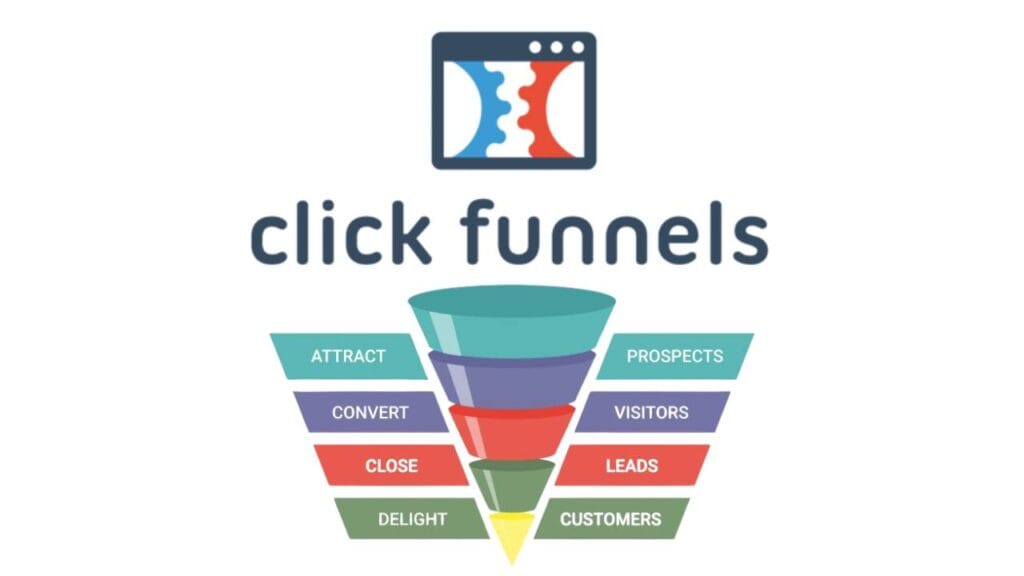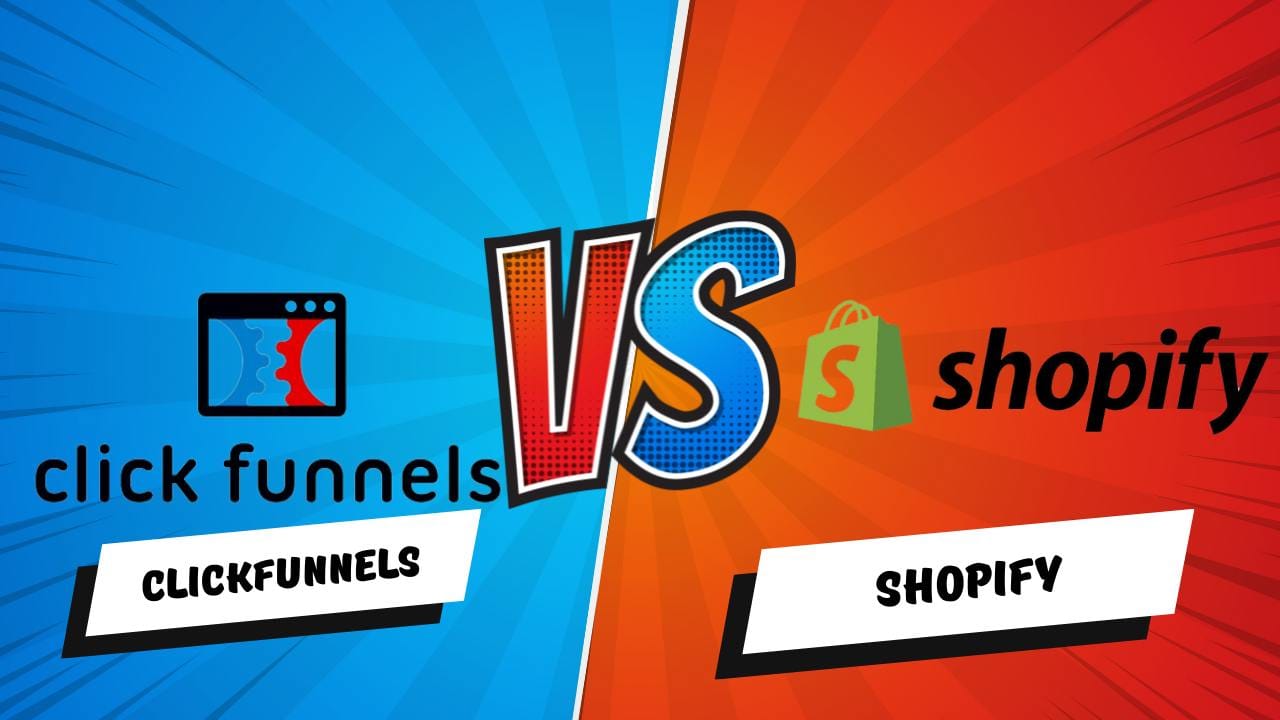When choosing the right platform for your business, you may find yourself evaluating ClickFunnels vs Shopify. These two platforms, while seemingly similar, serve distinct purposes and target different types of businesses. Understanding their unique features, pricing models, and potential drawbacks is essential to making the best choice for your needs.
In this detailed comparison, we’ll explore every aspect of ClickFunnels and Shopify, ensuring you have all the information necessary to decide which platform is right for your business.
ClickFunnels vs Shopify: The Ultimate Guide to Success
Table of Contents
What Are ClickFunnels and Shopify?
Before diving into comparisons, let’s clarify what each platform is designed for.
- ClickFunnels is a funnel-building software aimed at creating sales funnels to convert leads into customers. It’s widely used by marketers, entrepreneurs, and businesses focused on direct sales and lead generation.
- Shopify, on the other hand, is an eCommerce platform designed to help you set up and manage an online store. It’s ideal for selling physical or digital products, with robust tools for inventory management, shipping, and customer service.
While both platforms overlap in online business applications, they have unique strengths that cater to specific needs.
Core Features of ClickFunnels

1. Funnel Builder
ClickFunnels shines in its ability to create customized sales funnels. From lead magnets to upsell and downsell pages, the funnel builder is intuitive and highly effective for improving conversions.
2. Pre-Built Templates
With a vast library of templates, you can create landing pages, webinar funnels, and opt-in forms in minutes.
3. One-Click Upsells and Downsells
ClickFunnels allows seamless upselling and cross-selling, which increases the average order value for your business.
4. Membership Sites
This platform makes it easy to create membership-based content with exclusive access for your audience.
5. Integration Options
ClickFunnels integrates with popular tools like Zapier, PayPal, and Stripe, ensuring smooth workflows.
Core Features of Shopify

1. Store Builder
Shopify provides a user-friendly interface for creating an online store. Its drag-and-drop tools make designing your store straightforward.
2. Inventory Management
Track your products, restock items, and monitor sales performance directly from the dashboard.
3. Payment Gateways
Shopify supports over 100 payment gateways, making transactions simple and accessible to customers worldwide.
4. Shopify App Store
Enhance your store’s functionality with apps for SEO, email marketing, and product reviews.
5. Multi-Channel Selling
Shopify lets you sell on platforms like Amazon, eBay, and social media, expanding your reach effortlessly.
Detailed Comparison Table: ClickFunnels vs Shopify
| Feature | ClickFunnels | Shopify |
|---|---|---|
| Primary Purpose | Funnel building for lead generation and sales optimization | eCommerce platform for online store management |
| Ease of Use | Intuitive but may require learning for beginners | User-friendly with a guided setup process |
| Starting Price | $147/month | $39/month |
| Free Trial | 14 days | 3 days |
| Customization Options | Limited customization focused on sales pages | Extensive customization for storefronts and product pages |
| Templates | Pre-built funnel templates optimized for conversions | Professionally designed themes for eCommerce |
| Marketing Tools | Built-in email automation, A/B testing, retargeting | Requires apps for advanced marketing capabilities |
| SEO Features | Basic SEO options (limited control over URLs and meta tags) | Robust SEO tools for blogging, meta descriptions, and product page optimization |
| Payment Gateways | Limited integrations (Stripe, PayPal, etc.) | Supports over 100 payment gateways globally |
| Multi-Channel Selling | Not a primary focus | Integrated tools for selling on Amazon, Facebook, and Instagram |
| App Ecosystem | Fewer integrations; relies on native tools like Actionetics | Thousands of apps available in the Shopify App Store |
| Inventory Management | Basic tracking for physical or digital products | Advanced inventory management for multiple SKUs |
| Analytics | Built-in analytics for funnel performance | Detailed analytics for store performance and sales |
| Mobile Optimization | Responsive funnels optimized for mobile | Mobile-friendly themes and shopping experiences |
| Support | 24/7 chat and email support; no phone support | 24/7 chat, email, and phone support |
| Best For | Digital marketers, course creators, and entrepreneurs focusing on lead generation | eCommerce businesses managing inventory and selling physical or digital products |
| One-Click Upsells/Downsells | Yes | Requires third-party apps |
| Membership Sites | Built-in tools for creating membership content | Requires apps or custom coding |
| Scalability | Scalable for funnel-based businesses; less suited for large product catalogs | Highly scalable for small to large-scale online stores |
| Transaction Fees | No additional fees (only payment gateway fees) | Varies by plan unless using Shopify Payments |
| Overall Focus | Optimized for high-conversion sales funnels | Comprehensive tools for eCommerce and online store management |
This table highlights the key differences and strengths of each platform, helping you determine which is best suited for your business needs.
Also Read: Builderall vs ClickFunnels
ClickFunnels vs Shopify: Key Differences
Purpose and Use Case
- ClickFunnels is built for marketers focusing on lead generation and direct sales. It excels in creating an optimized customer journey.
- Shopify is tailored for eCommerce businesses looking to manage an inventory-based store.
Ease of Use
- ClickFunnels offers a straightforward drag-and-drop funnel builder but may require some learning for beginners.
- Shopify is intuitive for beginners and provides guided steps for setting up an online store.
Pricing
- ClickFunnels pricing starts at $147/month for basic plans, while Shopify offers plans starting at $39/month.
Customization
- ClickFunnels focuses on sales page customization, offering less flexibility for an eCommerce-style store.
- Shopify provides detailed customization options for storefronts, product pages, and checkout processes.
Which Platform Excels in Lead Generation?
ClickFunnels is undoubtedly superior for lead generation, thanks to its robust tools like email automation, retargeting, and A/B testing. Shopify can achieve lead generation with third-party apps but lacks built-in features optimized for this purpose.
Which Platform Excels in eCommerce?
Shopify is the winner in the eCommerce category. It offers advanced features for product management, payment processing, and inventory tracking that ClickFunnels lacks.
Pricing Comparison: ClickFunnels vs Shopify
| Feature | ClickFunnels | Shopify |
|---|---|---|
| Starting Price | $147/month | $39/month |
| Free Trial | 14 days | 3 days |
| Transaction Fees | None | Varies by plan |
| Additional Features | Included in base plan | Requires app purchases |
While ClickFunnels is pricier, its all-in-one features may justify the cost for businesses prioritizing funnels and direct sales. Shopify’s lower starting cost appeals to small eCommerce store owners.
Customization and Design Flexibility
Shopify provides extensive customization options with themes and a drag-and-drop editor. You can tweak every aspect of your store to match your brand.
ClickFunnels, while less flexible in design, focuses on optimizing the user journey. Its templates prioritize conversions over aesthetics.
Integrations and Apps
Both platforms excel in integrations:
- ClickFunnels: Includes tools like Zapier and Actionetics for automation.
- Shopify: Features an app store with thousands of apps for various needs, from marketing to logistics.
SEO and Marketing Tools
Shopify includes SEO-friendly features like custom URLs, meta tags, and blogging capabilities.
ClickFunnels provides powerful marketing tools like email sequences, split testing, and webinars. However, its SEO features are limited compared to Shopify.
Customer Support
- ClickFunnels: Offers 24/7 chat and email support but no phone support.
- Shopify: Provides 24/7 chat, email, and phone support for all users.

Pros and Cons of ClickFunnels vs Shopify
| Platform | Pros | Cons |
|---|---|---|
| ClickFunnels | – Excellent for building sales funnels and optimizing conversions. | – High monthly cost compared to Shopify. |
| – Integrated tools for email automation and A/B testing. | – Limited eCommerce features for managing large inventories. | |
| – Pre-designed templates focused on boosting sales. | – Basic SEO capabilities compared to Shopify. | |
| – Ideal for selling digital products, courses, or services. | – Not suited for businesses needing detailed inventory management. | |
| – One-click upsell and downsell features to increase revenue. | – Fewer third-party app integrations compared to Shopify. | |
| Shopify | – User-friendly interface with guided setup for beginners. | – Limited built-in marketing tools; often relies on apps. |
| – Extensive app ecosystem for expanding store functionality. | – Transaction fees unless using Shopify Payments. | |
| – Robust inventory management for businesses with physical or digital products. | – Funnel-building requires third-party apps, which may add to costs. | |
| – SEO-friendly tools for better search engine visibility. | – Advanced customization may require knowledge of Liquid (Shopify’s coding language). | |
| – Scalable for businesses of any size, from small shops to large enterprises. | – Apps and add-ons can increase overall costs beyond the base subscription. |
This concise table outlines the strengths and weaknesses of ClickFunnels and Shopify, making it easier to assess which platform aligns with your business requirements.
ClickFunnels vs Shopify: Which Should You Choose?
Your choice depends on your business model:
- If you’re a marketer or sell digital products, ClickFunnels is your go-to.
- For an inventory-focused eCommerce business, Shopify is unbeatable.
FAQs
What is better for small businesses, ClickFunnels or Shopify?
It depends on your goals. ClickFunnels is better for lead generation, while Shopify is ideal for small eCommerce stores.
Can I use ClickFunnels for eCommerce?
Yes, but it’s not optimized for managing large inventories or processing multiple product categories like Shopify.
Does Shopify have built-in funnels like ClickFunnels?
No, but third-party apps can replicate funnel-like experiences.
Which platform is more affordable?
Shopify has lower starting costs but may require additional apps.
Can I integrate ClickFunnels and Shopify?
Yes, you can integrate them using tools like Zapier to combine their strengths.
Which platform is better for beginners?
Shopify’s guided setup process is more beginner-friendly than ClickFunnels.
You Might Like: Top Trends in Digital Services: What to Expect in 2025
Conclusion
Both ClickFunnels and Shopify are powerful tools, but their value lies in their specific use cases. If you prioritize conversions through funnels, ClickFunnels is unmatched. If your focus is on creating a robust eCommerce store, Shopify delivers everything you need.
By understanding your business goals, you can make a well-informed decision that maximizes your growth and efficiency.

